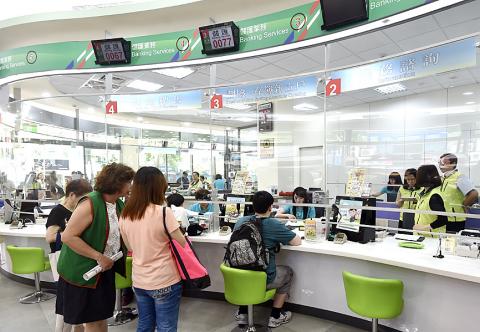Taiwan Postal Workers’ Union members are to march in Taipei today over what they say are unequal subsidies between employees hired before Chunghwa Post’s reorganization 16 years ago and those who joined later.
As of yesterday, more than 2,200 people had signed the union’s online petition demanding equal subsidies for the same work, the union said, adding that more than 500 post office staff members nationwide would take part in the rally today, marching from the Ministry of Transportation and Communications to the Control Yuan and the Executive Yuan.
When Chunghwa Post was reorganized into a government-owned corporation in 2003, civil servants employed at the post office were deemed “transferred personnel,” while those that were hired after the change were considered “hierarchical personnel,” the union said.

Photo: Chien Jung-fong, Taipei Times
Currently, the postal service employees about 11,000 transferred personnel and 14,000 hierarchical personnel, it added.
Union deputy manager Chen Guang-chih (陳廣志) said the two types of employees have separate salary systems, in which the transferred personnel are regulated by a compensation system designed for transportation industry staff, while the hierarchical personnel are paid according to Chunghwa Post’s salary system.
Postal staff have few complaints regarding the difference in salary and the use of different salary systems, given the two kind of personnel are different to begin with, Chen said.
However, many find it unacceptable that the work subsidy for the two sets of employees are different, despite doing similar work.
For example, a window clerk at a post office from the transferred staff received a NT$4,800 monthly subsidy, while a member of the hierarchical group received none, Chen said, adding that for field staff who are transferred personnel, they receive a NT$6,000 monthly subsidy, but those of the hierarchical personnel receive only NT$3,500.
In today’s protests, the union is to call for an equal subsidy for the same work performed and a relaxation of the state-run company’s system that regulates employee cost rate, Chen said, adding that a rigid restriction cannot reflect the employees’ hard work and contributions.
It would take nearly 10 years for a hierarchical employee to have a monthly salary exceeding NT$40,000, assuming they have an annual raise of NT$950, while those working at other state-run companies, such as Taiwan Power Co (Taipower) and oil refiner CPC Corp, Taiwan could get a monthly salary exceeding NT$40,000 in about five or six years, Chen said.
This is why some working at Chunghwa Post would rather resign and work for Taipower or CPC when the opportunity arises, he said.

Chinese spouse and influencer Guan Guan’s (關關) residency permit has been revoked for repeatedly posting pro-China videos that threaten national security, the National Immigration Agency confirmed today. Guan Guan has said many controversial statements in her videos posted to Douyin (抖音), including “the red flag will soon be painted all over Taiwan” and “Taiwan is an inseparable part of China,” and expressing hope for expedited reunification. The agency last year received multiple reports alleging that Guan Guan had advocated for armed reunification. After verifying the reports, the agency last month issued a notice requiring her to appear and explain her actions. Guan

GIVE AND TAKE: Blood demand continues to rise each year, while fewer young donors are available due to the nation’s falling birthrate, a doctor said Blood donors can redeem points earned from donations to obtain limited edition Formosan black bear travel mugs, the Kaohsiung Blood Center said yesterday, as it announced a goal of stocking 20,000 units of blood prior to the Lunar New Year. The last month of the lunar year is National Blood Donation Month, when local centers seek to stockpile blood for use during the Lunar New Year holiday. The blood demand in southern Taiwan — including Tainan and Kaohsiung, as well as Chiayi, Pingtung, Penghu and Taitung counties — is about 2,000 units per day, the center said. The donation campaign aims to boost

The Kaohsiung Tourism Bureau audited six hotels in an effort to prevent price gouging ahead of Korean band BTS’ concert tour in the city scheduled for Nov. 19, 21 and 22 this year. The bureau on Friday said that the audits — conducted in response to allegations of unfair pricing posted on social media — found no wrongdoing. These establishments included the local branches of Chateau de Chine, Hotel Nikko, My Humble House, and Grand Hai Lai, it said, adding that the Consumer Protection Commission would have penalized price gougers had the accusations been substantiated. The bureau said the Tourism Development Act

The military yesterday said it has located the flight data recorder, or black box, of an F-16V jet that disappeared off eastern Taiwan earlier this month, and it would soon deploy a salvage team to try to retrieve it. Air Force Command Headquarters said that while it had pinned down the location of the black box, it was still searching for the aircraft’s sole pilot, air force Captain Hsin Po-yi (辛柏毅). Without providing details, the air force said it had located the black box days after detecting some intermittent signals and would now engage a team of professionals to retrieve it. The air